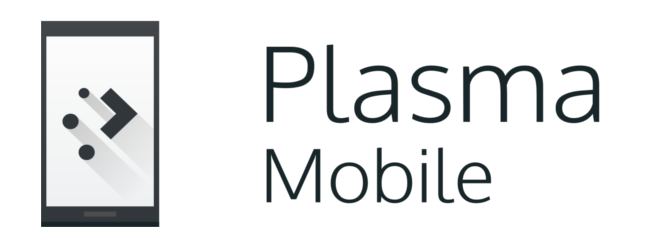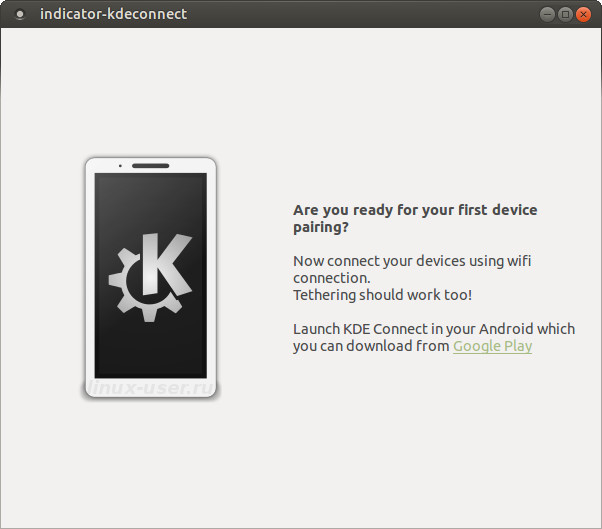- Download
- Linux Desktop
- Android
- Plasma Mobile
- SailfishOS
- Windows
- macOS
- Source code
- Get Started
- Pairing Two Devices
- Features
- Troubleshooting
- Как установить kdeconnect в Ubuntu / Debian
- Установка:
- Подробная информация о пакете:
- Зависимости:
- Подключите (синхронизируйте) андроид с Ubuntu/Linux Mint без проводов
- Функции KDE Connect объединяющие ваш телефон и компьютер:
- KDEConnect
- Contents
- What is KDE Connect?
- Installation and Usage
- Build KDE Connect from source
- Linux Desktop
- Using a meta-build system
- Without a meta-build system
- Windows
- Android
- MacOS
- Special Mentions
- Plasmoid Development
- Mobile-Friendly QML App
- Desktop SMS Messaging App
- Development
- Setting up KDE Connect Repository for Development
- Set up second remote (Optional)
- Development tips
- Restarting the daemon
- Debug Logging
- DBus inspection
- Running KDE Connect on an emulator
- Release Process
- C++ Application
- Tarballs
Download
Linux Desktop
KDE Connect is available in all major distributions and works in all desktop environments. GNOME users might prefer using GSConnect, a GNOME extension that implements the KDE Connect protocol.
Android
KDE Connect for Android is available on Google Play, Huawei AppGallery and F-Droid.
Plasma Mobile
A mobile friendly interface for mobile Linux platforms such as Plasma Mobile is also available.
SailfishOS
KDE Connect is available for SailfishOS in openrepos.net.
Windows
You can now get KDE Connect from The Microsoft Store.
Offline installers are also available via KDE’s Software Distribution Network.
macOS
An early release version for Mac OS can be build following these instructions.
Source code
The source code for the desktop and Android version is available on KDE’s Gitlab instance. For detailed instructions on how to build KDE Connect from source, check the Get Involved page.
Get Started
Pairing Two Devices
Pairing two devices is the first step in using KDE Connect.
Features
A list of all features that are there in KDE Connect.
Troubleshooting
Still having issues? We have a troubleshooting section with all the commons issues.
The Android robot is reproduced or modified from work created and shared by Google and used according to terms described in the Creative Commons 3.0 Attribution License.
Источник
Как установить kdeconnect в Ubuntu / Debian
Установка:
Для установки kdeconnect в Ubuntu / Linux Mint / Debian, введите в Терминал :
Подробная информация о пакете:
Подключите смартфоны к вашему рабочему пространству KDE Plasma
Зависимости:
Инструменты для использования служб KDE из командной строки
Абстракция ресурсов и сетевого доступа
Библиотека GNU C: общие библиотеки
Библиотека для преобразования символов в X нажатие клавиш [время выполнения]
Библиотека поддержки GCC
Структура настроек конфигурации для Qt
Дополнительные виджеты для упрощения конфигурации.
KDE Frameworks 5 дополнений к QtCore
Библиотека классов для qtdbus
Дополнительные API для написания модулей KConfig.
Абстракция ресурсов и сетевого доступа
Абстракция ресурсов и сетевого доступа
Абстракция ресурсов и сетевого доступа
Фреймворк для уведомлений на рабочем столе
Расширенная интроспекция плагинов и сервисов
Расширенная интроспекция плагинов и сервисов
Оболочка библиотеки Qt для библиотек Wayland
Дополнительные виджеты и классы для приложений, использующих модуль Qt Widgets
Библиотеки для криптографической архитектуры Qt
Плагины QCA для libqca2
Модуль ядра Qt 5
Модуль D-Bus Qt 5
Модуль Qt 5 GUI
Сетевой модуль Qt 5
Модуль виджетов Qt 5
Qt 5 X11 Дополнительно
Стандартная библиотека GNU GNU v3
X11 клиентская библиотека
X11 Testing — библиотека расширений записи
Qt 5 Модуль быстрого управления QML
Qt 5 Qt Quick Controls 2 Модуль QML
Qt 5 Quick Layouts QML-модуль
Qt 5 Qt Quick 2 QML-модуль
Клиент файловой системы на основе протокола SSH File Transfer Protocol
Источник
Подключите (синхронизируйте) андроид с Ubuntu/Linux Mint без проводов
KDE Connect позволяет обмениваться данными между вашим Linux и Android / Blackberry устройством. Используя KDE Connect, Вы сможете получать уведомления с вашего телефона прямо на Ваш рабочий стол Linux, или наоборот, использовать андроид устройство как пульт дистанционного управления для вашего рабочего стола Linux.
KDE Connect использует защищенный протокол связи для того, чтобы обеспечить безопасность. Также KDE Connect позволяет разработчикам создавать плагины. Сейчас доступны клиенты KDE Connect для Android и Blackberry устройств, вскоре появятся и для iPhone.
Значит для смартфона данное приложение ищите в магазине приложений.
KDE Connect является инструментом для интеграции рабочего стола компьютера со смартфоном, который стремятся встроиться в любые системы, используя libappindicator.
Функции KDE Connect объединяющие ваш телефон и компьютер:
- Общий доступ к файлам и веб-сайтам из любого приложения без проводов.
- Легко как скачивать так и загружать файлы на смартфон
- Сенсорная панель эмуляции: Используйте экран телефона в качестве сенсорной панели для вашего компьютера.
- Синхронизация уведомлений (4.3+): читайте свои Android уведомления на рабочем столе Linux.
- Общий буфер обмена: копирование и вставка между телефоном и компьютером.
- Пульт дистанционного управления мультимедиа: Используйте телефон в качестве пульта ДУ для Linux медиа-плееров.
- WiFi соединение: не нужен USB провод или Bluetooth соединение.
- RSA шифрование: ваша информация в безопасности.
KDE Connect доступен для Ubuntu 15.04 Vivid/14.10 Utopic/14.04 Trusty/Linux Mint 17.1/17/ и других производных Ubuntu.
Чтобы установить KDE Connect и индикатор в Ubuntu / Linux Mint откройте терминал (нажмите Ctrl + Alt + T), и выполните следующие команды:
Если вы хотите, чтобы KDE Connect запускалась при старте системы, введите следующую команду в терминале:
После запуска программы на компьютере нужно запустить kde connect на смартфоне. Если устройства находятся в одной сети, то Вы легко их «спарите». Интерфейс программа довольно простой, что на компьютере, что на смартфоне — приятного использования.
Для Android KDE Connect можно найти как в магазине Play Google, так и в магазине исключительно бесплатных приложений F-Droid.
Источник
KDEConnect
This is the community page for KDE Connect. Feel free to edit it! It should contain useful and up-to-date resources for both users and developers.
Contents
What is KDE Connect?
KDE Connect is a project that enables all your devices to communicate with each other. Here are a few things KDE Connect can do:
- Receive your phone notifications on your desktop computer and reply to messages
- Control music playing on your desktop from your phone
- Use your phone as a remote control for your desktop
- Run predefined commands on your PC from connected devices. See the list of example commands for more details.
- Check your phones battery level from the desktop
- Ring your phone to help finding it
- Share files and links between devices
- Browse your phone from the desktop
- Control the desktop’s volume from the phone
To achieve this, KDE Connect:
- implements a secure communication protocol over the network, and allows any developer to create plugins on top of it.
- Has a component that you install on your desktop.
- Has a KDE Connect client app you run on your phone.
This video from 2013 demonstrates some other cool features: https://www.youtube.com/watch?v=KkCFngNmsh0
More info at Albert Vaka’s or Nico’s blog.
Installation and Usage
Please see the KDE Connect Userbase page for detailed information on the different ways KDE Connect can be installed and used.
Build KDE Connect from source
KDE Connect is a free/ libre open source software, being developed for over 8 years now.
Linux Desktop
KDE Connect can be built directly from source using CMake and system-installed dependencies.
Alternatively, you may use a meta-build system like kdesrc-build or Craft, both of which have the added benefit of leaving your linux installation unaffected and containing the dev files to a single directory.
Using a meta-build system
- Craft is a cross-platform meta-build system that works quite well on Windows and Linux for KDE Connect devel.
- Set up Craft using this link, and then visit here for instructions to use Craft to build KDE Connect.
- kdesrc-build is a meta-build system that is used by many long-term KDE developers as their daily driver for KDE devel on Linux. See here for comprehensive build instructions.
Without a meta-build system
KDE Connect uses CMake as its build system, which will tell you if you are missing any dependencies. See here for build instructions.
Windows
KDE Connect is officially supported on Windows. See here for build instructions.
Android
The most convenient dev-flow way is to pass the project URL to Android Studio, build the app and install it to your phone. Remember to uninstall any already-installed KDE Connect app from your target Android device. You can also build the android app through CLI using gradle.
You can also run the app in an emulated Android device for devel. See [/Android_Emulator/ here] for instructions.
Since KDE Connect iOS is being developed in native frameworks, a recent version of Xcode is required to build the app. However, due to the special entitlements used in the complete version of KDE Connect, it can only be signed by the KDE e.V. development team. A wiki page is currently being written with information on how building and distribution would work and the possible resources available to contributors without macOS access.
MacOS
KDE Connect works fairly well on macOS, however there is no official version as of yet. See here for build instructions.
You can get the Nightly Build from the Binary Factory.
Special Mentions
Special instructions for specfic topics.
Plasmoid Development
You can use plasmawindowed to easily run the Plasmoid (even on non-KDE environments).
Set up your dev environment as above, then run make install , then run plasmawindowed org.kde.kdeconnect to launch the Plasmoid and see your changes.
Mobile-Friendly QML App
The kdeconnect-app component of the desktop version is suitable for mobile Linux environments, too.
Desktop SMS Messaging App
KDE Connect has an SMS messaging app which lets you type and view SMS messages from your computer. It supports basic features and works correctly most of the time. If you are interested in trying or developing it, you can build it from source. It is automatically built as part of the rest of KDE Connect and is output as ‘kdeconnect-sms’.
Development
KDE Connect is a perfect project to start contributing to KDE. You’ll need a basic understanding of programming concepts, the rest can be learned by doing. Experience with Android or Qt is beneficial, but not needed.
We have a group to discuss development. You can access it from Telegram, IRC (#kdeconnect) or matrix.org (#freenode_#kdeconnect:matrix.org). Feel free to ask any development-related questions there. We also have a mailing list.
All patches are submitted on Gitlab. The Android repository is here and the C++ Desktop repository is here. Be sure to select the most relevant template. You don’t need to assign any reviewers, the developers are subscribed to notifications. Should this be your first patch, it’s good to know that it might take some time before your patch is reviewed (we all work on KDE Connect in our free time), and you’ll probably have to make some changes a couple of times. That’s not because you’re new, that’s what happens for all reviews (even for long-time contributors).
There are a couple of tasks marked as Junior Jobs on our workboard. Those have some extra information on how to approach them that help you get started.
Setting up KDE Connect Repository for Development
KDE Connect is actually composed of two repositories; one for the Android implementation and one for the C++ (Desktop) implementation. You can have a local clone of both on your computer and the steps to set them up are the same. For these directions, I will use the C++ repository, but if you want the Android repository, just replace every instance of ‘kdeconnect-kde’ with ‘kdeconnect-android’
- Fork the repository
- With your web browser, open the Web GUI to KDE Connect’s GitLab: https://invent.kde.org/network/kdeconnect-kde
- If you are not already, sign in with your KDE identity by clicking the «Sign In» button in the top left
- Click the «Fork» button, near the top right
- Wait for the forking to complete
- Clone your fork
- Open your new fork in the GitLab web GUI
- Click the «Clone» button in the top right
- Select the method of cloning
- I recommend SSH. This will require you add an SSH public key to your KDE GitLab account.
- An HTTPS clone will require you to log in with your KDE Identity credentials to push changes.
- In the folder you want to clone, do ‘git clone ‘
You are all set up! See the optional steps for ways to make life easier.
Set up second remote (Optional)
Having a second remote allows you to have your local ‘master’ branch track the upstream kdeconnect-kde master branch, so you can easily get all the latest changes.
These steps assume you are using command-line git. If you are using a GUI tool, the steps will be different, but the ideas will be the same.
- On the command line, change to your local repository clone
- Execute:
- Now whenever there are new changes upstream, simply pull the upstream-master branch, then merge or rebase your local branches onto those changes!
Development tips
Restarting the daemon
Whenever you do a change to KDE Connect you need to restart the daemon for the change to take effect.
Debug Logging
By default, most Linux distributions tell Qt to restrict what logging you will see. You can control this using the QT_LOGGING_RULES variable. Running something like the below command will show most all logging.
DBus inspection
The daemon communicates with various UI components (Plasmoid, CLI, Indicator etc.) over DBus. QDbusViewer allows inspecting the DBus interface provided by the daemon which can be incredibly useful for debugging.
Running KDE Connect on an emulator
How to setup running KDE Connect on an emulator is described here Android_Emulator
Release Process
The following sections describe how to release a new version KDE Connect
C++ Application
Tarballs
Tarball releases are handled automatically through KDE’s release process. These are typically consumed by downstream distros in their release process.
Источник











